Is Fighting for Tone a Requirement?
Happened to be listening to a radio interview with the violinist Midori the other day. She was talking about her particular instrument in a way that prompted the interviewer to remark that it’s almost like she was describing it in an interactive way, almost like it was a horse and she was the rider…
…which prompted the interviewer to then ask whether Midori ever has to fight her instrument. She said – I’m paraphrasing loosely – yes, that if there wasn’t any fighting, it wouldn’t be as interesting.
My brain of course flipped to over to rock, and here’s where it ended up:
1. Lots of the players you read about here on WoodyTone have had to fight with their tone – or have had to fight to get their tone. Don’t have to list the ways because you know them. The bottom line is that tone-chasing is a long-term game and there are no plug-n-play solutions for true woody tone.
2. Conversely, if a player doesn’t have to fight to get their tone – I’m thinking of Nickelback, Cookie Monster metal, etc. – it’s really not interesting.
A PRS and a Mesa gets you…what? “Easy” tone?
‘Easy’ Tone Not Good?
A lot of today’s gear seems to be oriented to getting “easy tone.” You have factory QC (part uniformity), lower prices thanks to offshore manufacturing, preamp distortion, master vols, pedals and pickups galore, 70 different speakers to choose from – the list keeps going.
So you can plug into just about any amp with any guitar and get articulate [insert classic guitar model here]-ish tone with tons o’ sustain, one of the key things that every big guit-slinger was going for back in the day.
So you can sound like a hero, can hold a note for 48 hours and strike a pose, but is it a tone that will give you, y’know…wood?
And you can’t really blame the manufacturers, or even the players.
Players don’t want to fight their gear too much, or maybe even not at all. They don’t want to worry about blown trannies or speakers or sustain or whatever the problems were back in the day.
The manufacturers just want to give people what they want: The ability to sound like their heroes without having to play a 3,000 db and have to mess around with gear for 20 years.
Still, while all of that is understandable, I think maybe you do have to be fighting something to get great tone. Maybe it’s volume (EVH et al.), maybe feedback (Hendrix, Rhoads), maybe sustain (Iommi, Blackmore, SRV, etc.), maybe drums (Page?), maybe the lead singer (lol), maybe the strings (AC/DC), pickups, the venue, even the guitar itself (Lynch).
If not, listen to the newer tones of the older players. EVH, Iommi, Priest, Nugent, Skynyrd, Frehley – their newer tones are easier, but are they better? Or even as good as they were?
Of course, not all of the players have changed – the Young brothers and Yngwie come to mind. They’re still fighting for their tones, and they still sound great.
I don’t know, man, something to think about.
Fighting Doesn’t Mean Crappy Gear
Oh yeah, one more thing: Fighting it doesn’t mean playing with crappy gear, a la Jack White. Midori isn’t using some crappy violin. Hers is about 300 years old. Seems like all musicians like vintage gear….
Old wood is good!
Category: Tone Questions

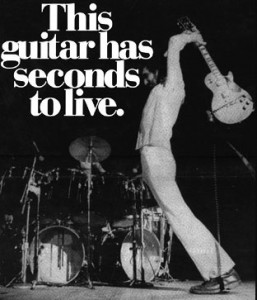





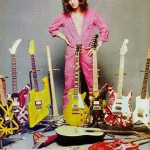
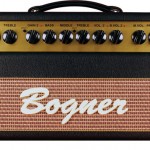

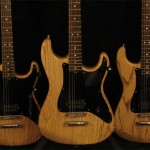


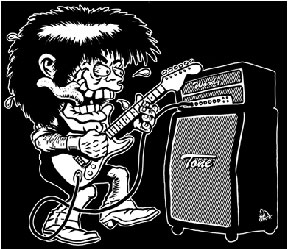

I had never considered this but it is absolutely true. All of my favorite guitar tones came from people who were fighting for it.
A few years back I switched out pretty much all of my gear and went over to some older 50’s/60’s amps along with removing all effects other than fuzz/boost and whatever might be onboard the amp (reverb/vibrato). I do have to fight for my tone now which I never did before. But the proof is in the pudding because my tone now compared to a few years back is like night and day. It has taken a lot of time, money, and research to get everything to where I like it. A little luck as well. It sure is worth it though!
Great article.
No, you don’t have to fight. Bearing in mind that players try to get a certain ‘vintage’ tone, for the simple fact that their influences from decades past had that tone, and those players simply made due with what gear was available at the time. An example of this is the renewed interest in analog delay pedals. People are using them to get the darker repeates that breakdown as they decay. If a digital delay that reproduced each repeat clearly was used by the guitar heroes of the 60’s and 70’s; while no one can be sure, id wager that that’s what would be used now.
I work weekends repairing guitars at a friends shop. He goes by the mindset “Hendrix didn’t have to use it”. But I always found that to be short sighted. This particular instance that came to mind when heused that line was in the context of a debate we were having on self-lubricating nuts and saddles, and putting locking tuners on Strats. The major flaw in that argument is apparent whenever you watch any extended concert footage of Hendrix, SRV, annd other players that played rough with their instruments. Besides watching strings break throughout the concert, you also see them having to retune not just after every song (and they do it after EVERY song), they had to do it mid-song lots of times.
While Floyd Rose were available during SRV’s time, they weren’t during Hendrix’s. Now Stevie most likely didn’t use them because they affect the tone in a way he probably found unappealing, this more than likely was because, again his heroes didn’t use them and hence didn’t have that tone. I think Hendrix probably would have used them if they were available. In the same way EVH didn’t have them available to him when he started out, but he quickly went to them when they were, and the rest is history.
People, in a pefrect world, tend to have an easier time making a quality, fufilling life than their parents did, especially if their parents were first generation immigrants, and I live in a city that back in the 80’s and early 90’s, was filled w/them. But their parents worked harder and had less time to sit back and relax, because they wanted their children to have it easier, and have more oppertunities not available to them. The same can be said for contemporary players copping vintage tones by running their guitars equipped with custom wound pickups, through pedal boards, and into pure tube amps, without digital modelling, and be able to conjure up Fender and Marshall tones out of the same amp.
Now, I prefer to play Strats, though I own several Gibsons and a PRS, because I do have to fight it more. The longer neck, along with 11-12 gauge strings (depending on either E or Eb tuning, detuning pastthat kills the tone) makes for a more difficult time in bends and vibrato than say; thr 24 3/4″ Gibson scale. But I find the fight helps mefrom getting complacent, and forces me to play with more “technique” than is required to play the Gibsons with their looser string tension, but it has nothing to do with trying to elicite a tone.
But, that’s just myopinion. I agree there are certain things that technology can’t gigve use that only blood, sweat, and calloused fingers can.
It’s my feeling you can probably get a 90% tone fairly quick, but getting that final 10% can take years.
“It’s my feeling you can probably get a 90% tone fairly quick, but getting that final 10% can take years”-rockman627
-This is the truth of the matter. Its like being an athelite. The difference between playing major league, and the minors is about 1%, but that makes all the difference.
The really sad thing is. all the money we players and tone hunters spend, not to mention the hours of research on gear serious buyers put in, give us the 10% and the fact of the matter is; that 10% is really only important to OTHER GUITAR PLAYERS LOL. The people we play for only concentrate on the 90%
Especially when higher gain comes into play. Once you hit a certain threshold in distortion on a stage, especially a large one, anymore makes no affect on the listener. Actually, in most cases, all it does it make your tone indistinguishable.